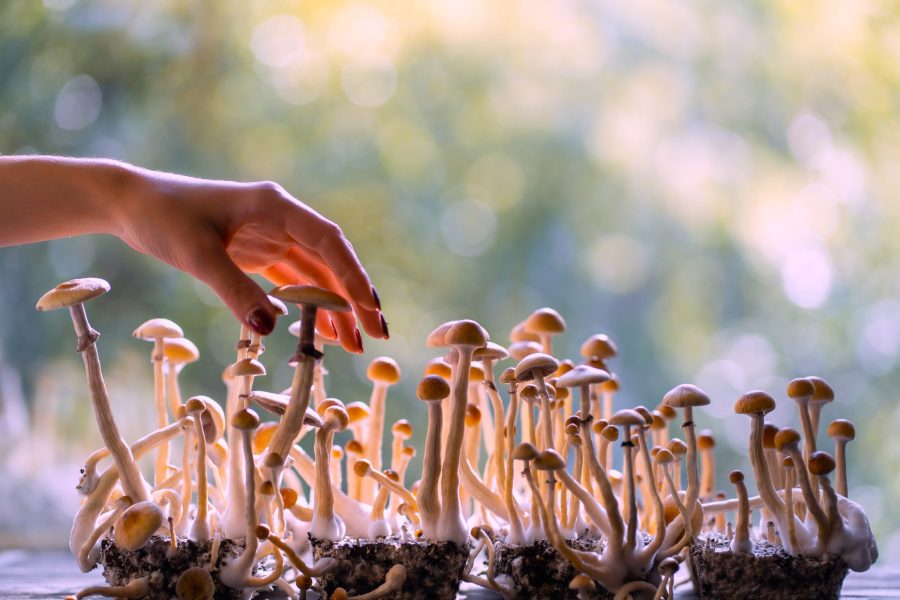An interesting research was presented at the Psychedelic Science conference in Denver in June 2025. According to this study, just one single dose of psychedelic mushrooms could relieve depression for 5 years! Sounds magical, doesn’t it? That is exactly why psychedelic mushrooms are also known as ‘magic mushrooms’.
So, what if there was a way to reset the shadowy thoughts lingering in some corner of your mind? And that too, not with a pill every morning, but with one carefully guided experience. That is where psilocybin, the main psychoactive ingredient in magic mushrooms, is stepping out of folklore and into serious mental health research. Once belonged to whispered circles, today psychedelic mushrooms are being studied as tools for hope, resilience, and real healing.
The U.S. psychedelic mushroom market stood at $2.25 billion in 2024, and depression & anxiety relief applications constituted a significant portion of this. The U.S. Food and Drug Administration (FDA) has granted Breakthrough Therapy status to psilocybin for treatment-resistant depression (TRD) and major depressive disorder (MDD), recognizing its strong clinical potential.
Why the Psychedelic Mushroom Industry is Gaining Traction in the U.S.
The U.S. faces an escalating mental health burden. Over 21 million U.S. adults (nearly 8%) experience major depressive episodes annually, and many find standard antidepressants ineffective or intolerable due to side effects like fatigue, weight gain, or emotional blunting. Psilocybin offers a radically different approach. Rather than daily medication, it is administered once or twice in a controlled setting, aiming for long-term emotional clarity. The “less is more” model is appealing to both patients and providers burned out by chronic care cycles.
States like Oregon and Colorado have already rolled out legal, regulated psilocybin therapy programs, with trained facilitators, licensed centers, and ongoing oversight. These pilot programs have attracted national attention and are serving as models for future legislation. In some other states, such as California, Washington, and Vermont, decriminalization bills and exploratory task forces are gaining momentum, supported by veterans’ groups, mental health coalitions, and progressive policymakers.
Psychedelic therapy programs have also received strong support from research institutions in the U.S. Top-tier universities and medical institutions, including Johns Hopkins University and NYU Langone Health, are running robust and peer-reviewed clinical trials. These institutions lend credibility and clinical structure to a field that was long dismissed due to stigma. Their trials are helping build best-practice guidelines for dosage, integration therapy, and safety monitoring.
How it Works
When a person consumes psilocybin, the body quickly converts it into psilocin, the real compound responsible for the mind-altering effects. Psilocin structurally resembles serotonin, a neurotransmitter that regulates mood, perception, and anxiety. Because of this similarity, psilocin binds to serotonin 2A receptors (5-HT2A) in the brain, but instead of just increasing serotonin levels (like common antidepressants do), it changes how the brain processes information entirely.
In people with depression or anxiety, the brain’s Default Mode Network (DMN), a system involved in self-reflection, rumination, and memory, often becomes hyperactive. This can lead to repetitive negative thinking and a “stuck” mindset. Psilocybin temporarily reduces the activity of the DMN, helping people break out of rigid, self-critical thought patterns. That is why patients often describe the experience as “resetting the mind,” offering fresh perspectives on their problems or traumas.
The Bottom Line
When combined with skilled therapy, psychedelic mushrooms can be a uniquely promising tool in the fight against depression and anxiety. Clinical studies in the U.S. are confirming long-term relief with just one dose. Real-world users report genuine shifts in mood and meaning, and legislative shifts from coast to coast are laying the groundwork for broader access. At the same time, cautionary tales remind us that unregulated spaces can do harm, and that consent and oversight must guide this next chapter in mental health.
















